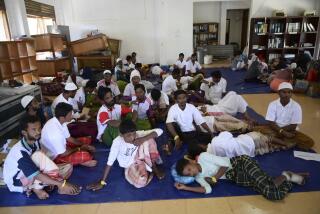Nigeria rescue of nearly 300 does not include most or all Chibok girls
A Nigerian official dashed hopes Wednesday that the army’s rescue of nearly 300 Nigerian girls and women from a militant group’s forest camps had freed most or all of the missing schoolgirls kidnapped from Chibok town last year.
But Tuesday’s rescue offered clues into the suffering of thousands of girls and women kidnapped by Boko Haram in recent years, with reports that some abductees were used as human shields for the group’s front-line fighters.
Amnesty International recently reported that Boko Haram had kidnapped at least 2,000 women and girls since the beginning of last year, including the 276 taken from a school near Chibok. Many kidnap victims were raped and forced into slavery, marriage or fighting for the group, it reported. Though dozens of the Chibok girls escaped, 219 are still missing.
Some Nigerian media initially reported that the military had rescued the Chibok girls in Tuesday’s operation, which freed 200 girls and 93 women. The Defense Ministry announced the rescue on Twitter after it invaded three bases in Boko Haram’s last stronghold, the Sambisa Forest.
Parents and supporters of the Chibok girls have run a high-profile campaign pressing for more action to win their release.
On Wednesday, army spokesman Sani Usman told news agencies that those rescued were not the Chibok schoolgirls, but later added it was possible some might be among those freed. Military spokesman Chris Olukolade told reporters the girls and women were still being screened to assess who they were and where they were from.
An unnamed intelligence official cited by the Associated Press said some of the girls and women in the Sambisa Forest camps were used as armed human shields, serving as the first line of defense around the bases.
It remains unclear whether some of the armed women were killed in the fighting. Also unclear was whether some removed from the forest may have been the legitimate wives of Boko Haram fighters rather than abductees.
The kidnapping of the Chibok schoolgirls last year roused global condemnation after Boko Haram leader Abubakar Shekau announced on video that he would sell them into slavery. Analysts believe the girls probably were split up. The military said shortly after the abductions that they knew the location of the girls but wouldn’t launch a rescue operation because it would lead to mass casualties among the victims.
The kidnapping of the girls was one reason President Goodluck Jonathan lost his bid for reelection last month, with perceptions of weakness and poor leadership as Boko Haram seized control of a large area of northeastern Nigeria, launching deadly attacks almost daily.
In recent months, however, Nigeria’s military has turned the fight around with the support of the armies of neighboring Chad, Niger and Cameroon as well as a group of mercenaries, many South Africans. It has taken back dozens of towns and villages and largely regained control of the road network, driving the insurgents into the dense Sambisa forest.
In recent days, a provincial government committee found about 400 decomposed bodies in the northeastern town of Damasak, which was recently abandoned by Boko Haram. They were found in 20 shallow mass graves, in houses, scattered in the streets and dumped in the river, committee member Babagana Mustapha told the AP.
The dead included women, children and men. Mustapha said the men scattered in the streets looked like Boko Haram fighters, probably killed when soldiers from Chad and Niger took the town from the militants in March.
The discovery follows that of about 70 bodies, many with their throats slit, under a bridge outside the same town. Locals also told Nigerian media that Boko Haram abducted scores of girls and women when they retreated from Damasak.
Despite being on the defensive, Boko Haram is still able to launch attacks, particularly in remote areas. On Saturday, its fighters assaulted the island of Karamga in Lake Chad, triggering heavy fighting with Chadian forces. Militants believed to be from Boko Haram killed a group of 21 men trying to return to their village in Yobe state last week.
Follow @robyndixon_LAT on Twitter for news out of Africa
More to Read
Start your day right
Sign up for Essential California for news, features and recommendations from the L.A. Times and beyond in your inbox six days a week.
You may occasionally receive promotional content from the Los Angeles Times.






